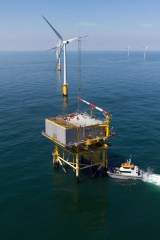Some EU Member States (MS) have introduced a maritime spatial planning (MSP) process to manage the activities taking place within their seas and coastal areas. Increased activities at sea are expected to contribute to economic growth and innovation. The E
uropean Commission has proposed a Directive that would oblige MS to make such plans and coordinate them with other MS.
Uses of maritime space
Competition for use of European maritime space is increasing, between wind and wave energy, fishing and aquaculture, oil and gas exploitation, cables, pipelines, shipping, tourism and defence, as well as environmental management. These activities often cross national boundaries.
Maritime spatial planning (MSP) is a relatively recent approach to overall planning and allocation of the use of seas and coastal areas. Benefits of MSP include efficient use of maritime space, prevention of conflicts, faster decision-making, reduced costs and a better investment climate.
EU marine and maritime policies
The integrated maritime policy (IMP) for the EU and the corresponding action plan provide a framework to coordinate the development of sea-based activities in an ecosystem-focused approach. The Marine Strategy Framework Directive is the environmental pillar of the IMP.
In 2012, the Commission adopted a blue growth strategy aiming to support sustainable growth in the marine and maritime sectors.
European Commission proposal
On 12 March 2013, the Commission presented a proposal for a Directive on maritime spatial planning and integrated coastal management, which would require MS to establish MSP processes and draw up maritime spatial plans and integrated coastal management strategies, using an ecosystem-based approach.
Each MS would remain responsible for its own planning process and the contents of the plans. However, MS would have to ensure public participation, establish cross-border cooperation, and organise the collection and exchange of data and information. MS would have to designate competent authorities.
The proposal aims to facilitate sustainable growth in the ‘blue economy’. A study on the economic effects estimates that MSP could reduce transaction costs by €0.4 to €1.8 billion by 2030, and generate economic gains between €0.155 and €1.6 billion through acceleration of investments in offshore wind and aquaculture.
Some reactions

The European Wind Energy Association, supports the proposal, which would provide more certainty for planning offshore wind energy investments and facilitate the creation of a European offshore electricity grid.
Environmental NGOs welcome the application of the ecosystem approach, coordination between countries, and public consultation. They insist that work on the MSP Directive should not further delay the designation and management of Marine Protected Areas.
The European Economic and Social Committee supports the proposal, but warns that an excessively bureaucratic approach could slow down initiatives. It regards communication between different users of a coastal and maritime area as essential.
The Committee of the Regions suggests that the proposal lacks flexibility for implementation and breaches the proportionality principle. A number of parliaments in Member States have raised concerns about subsidiarity.
European Parliament
The Transport Committee (rapporteur Gesine Meißner, ALDE, Germany) adopted its report on the proposal on 5 November 2013 with 32 votes in favour, 7 against and 0 abstentions. The Committee’s amendments would give MS more flexibility to implement MSP in accordance with national, regional and local needs and existing practices, thus addressing concerns about subsidiarity and proportionality.







